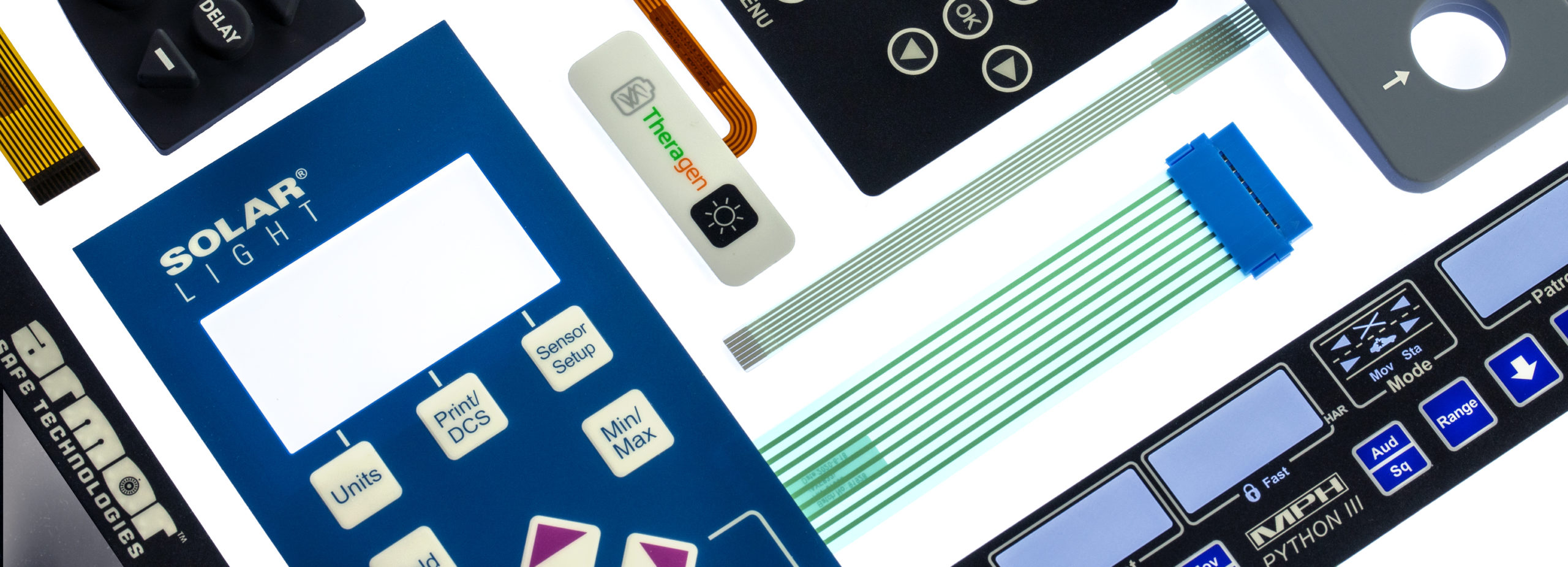Understanding the Relevance of Membrane Switches in Interface
Membrane switches are essential parts in the design of effective individual interfaces, facilitating not just functionality yet likewise improving aesthetic charm and individual communication. As we explore the numerous benefits and future trends linked with Membrane technology, it comes to be clear that these buttons are a lot more than simply elements; they stand for a convergence of development and practicality.
What Are Membrane Buttons?

The spacer layer, which consists of sticky residential properties, permits the separation of the circuit layer from the overlay, guaranteeing that the switch continues to be in a non-activated state up until pushed. When pressure is related to the overlay, it compresses the spacer layer, bridging the void and finishing the circuit in the underlying layer. This layout not just decreases the physical room required for standard mechanical buttons however additionally improves the toughness of the device, as Membrane buttons are typically immune to dust, moisture, and other environmental variables.
Commonly found in applications varying from consumer electronic devices to clinical devices, Membrane buttons are indispensable to modern-day technology, offering a efficient and user-friendly interface that aligns with contemporary layout needs.
Benefits of Membrane Buttons
While many switch technologies exist, Membrane Switches deal unique advantages that make them specifically desirable in different applications. Among the main advantages of Membrane switches is their portable design, which permits space-saving implementations in tools where genuine estate is restricted. Their slim profile not just enhances visual allure however also helps with light-weight construction.
Another considerable advantage is their resistance to environmental elements. Membrane buttons are typically sealed versus moisture, dust, and pollutants, making them optimal for usage popular atmospheres, such as medical gadgets and commercial devices. This sturdiness expands the lifespan of the button, lowering maintenance costs and enhancing reliability.
In addition, Membrane switches can be customized to fulfill specific design requirements, integrating one-of-a-kind graphics and shades that improve customer communication. Their tactile responses choices can likewise be tailored to supply an enjoyable customer experience. In addition, Membrane buttons are economical, particularly in high-volume applications, as they can be generated effectively.
Applications in Various Industries

In the consumer electronics field, Membrane switches are common in gadgets such as microwaves, cleaning machines, and remotes. Their responsive comments and aesthetic options improve individual experience while giving a sleek, modern appearance. Furthermore, auto producers use Membrane buttons in dashboard controls and infomercial systems, where space is limited, and individual interaction is critical.
Furthermore, the industrial market leverages Membrane buttons in control panels for machinery and tools, permitting user-friendly read review procedure in usually extreme atmospheres. Their resistance to chemicals and wetness makes certain longevity and dependability in these applications. In general, the flexibility of Membrane Switches contributes considerably to their widespread usage, making them vital in various technological domain names.
Design Considerations for Membrane Buttons

When designing Membrane buttons, a number of crucial factors to consider must be taken into account to make certain optimal performance and customer experience. The option of materials is critical; choosing sturdy, high-grade substrates can enhance the button's longevity and resistance to environmental variables such as dampness and temperature fluctuations.
Second of all, the design of the visuals overlay should prioritize quality and ease of use. Icons and text must be understandable, and the design ought to facilitate intuitive interaction (membrane switches). Additionally, tactile comments is vital; integrating a responsive dome or various other devices can boost the individual experience by offering physical verification of activation
One more crucial variable is the button's electrical efficiency. Designers need to guarantee that the conductive traces are correctly designed to minimize resistance and stay clear of signal interference. This entails examining the needed actuation pressure and ensuring compatibility with the electronic components they will certainly user interface with.

Future Trends in Membrane Modern Technology
As innovation remains to breakthrough, Membrane buttons are positioned to develop dramatically, driven by innovations in materials and producing strategies. One emerging pattern is the unification of sophisticated products, such as conductive inks and adaptable substrates, which boost longevity and reduce the overall weight of Membrane switches. These materials not only boost the responsive action yet also enable the design of buttons that can withstand harsher environmental conditions.
Furthermore, the combination of touch-sensitive innovations is transforming standard Membrane Switches right into more interactive interface. Capacitive touch sensing units installed within Membrane switch panels can provide an extra responsive and user-friendly user experience, lining up with the expanding need for sleek, modern designs in customer electronics.
In addition, improvements in printing methods, such as digital and 3D printing, allow fast prototyping and personalization of Membrane buttons. This adaptability enables producers to react faster to market demands and consumer choices.
Last but not least, sustainability is coming to be a significant emphasis, with producers exploring environment-friendly products and procedures. As these patterns unfold, the future of Membrane technology promises boosted performance, visual allure, and ecological duty, strengthening their duty in advanced user interfaces across different markets.
Final Thought
Finally, Membrane Switches represent an important part in the design of interface, integrating capability with visual flexibility. Their advantages, including official website resilience and resistance to environmental elements, make them appropriate for diverse applications across numerous markets. Thoughtful style considerations improve individual interaction and experience. As advancements in innovation continue, the development of Membrane switches is expected to additional improve interface, driving development and enhancing functionality in a progressively complicated technical landscape.
Membrane buttons are integral components in the layout of reliable individual interfaces, promoting not only functionality however additionally enhancing aesthetic charm and individual communication.Membrane Switches offer as an important component in various user interfaces, helping with a seamless communication between users and electronic tools.While numerous button innovations exist, Membrane Switches deal distinctive advantages that make them specifically preferable in various applications.Additionally, Membrane switches can be tailored to satisfy specific design requirements, incorporating unique graphics and shades that improve user interaction.In verdict, Membrane Switches stand for a crucial component in the layout of user interfaces, incorporating functionality with aesthetic flexibility.